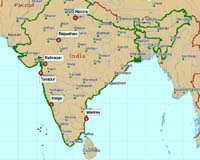 |
New Delhi (UPI) Aug 26, 2010 India passed a civilian nuclear liability bill Wednesday that paves the way for U.S. firms and other foreign companies to gain a foothold in India's nuclear energy market, which could exceed $150 billion in coming years. Indian Prime Minister Manmohan Singh said the legislation marks the end of India's isolation in the global nuclear market. "I categorically state that this bill completes in a way our journey to end the nuclear apartheid which the world had imposed on India," he said Wednesday. India's civil nuclear market opened up in 2008, when a landmark agreement between India and the United States ended three decades of sanctions imposed on New Delhi for conducting nuclear tests. But nuclear suppliers -- particularly American companies, that aren't state-subsidized like French and Russian competitors -- were reluctant to enter the Indian market without clarity on their liability in the event of a nuclear accident. General Electric Co. and Westinghouse Electric Corp. are seen as potential big players in India's nuclear power sector. However, the prime minister rejected claims that the bill was meant to facilitate the entry of American companies in India and that the government pushed to pass the bill before an expected visit by U.S. President Barack Obama in November. "To say this has been done to promote American interests, to help American corporations I think is far from being the truth," Singh said. The bill caps liability per accident at $320 million, compared to $106 million initially proposed. The nuclear liability debate had intensified amid the June court decision that amounted to little more than a slap on the wrist to Indian executives working for Union Carbide at the time of the Bhopal chemical leak in 1984, the world's deadliest industrial accident in which an estimated 10,000 people died within the first three days. After suing Union Carbide for $3.3 billion in 1985, the Indian government reached an out-of-court settlement of $470 million with the company in 1989. Singh said the government was doing "everything" to ensure safety of nuclear plants, Press Trust of India reports. Last September, India announced it aims to boost its nuclear energy capacity by 12,000 percent by 2050. The country plans to have 12 new nuclear reactors running by 2020. "We're very pleased it passed," said Chandajit Bannerjee, general secretary of the Confederation of Indian Industries of the legislation, the Los Angeles Times reports. "It's going to be one of the most important events in the development and growth (of India). This country needs power."
Share This Article With Planet Earth
Related Links Nuclear Power News - Nuclear Science, Nuclear Technology Powering The World in the 21st Century at Energy-Daily.com
 Indian nuclear bill clears parliament
Indian nuclear bill clears parliamentNew Delhi (AFP) Aug 25, 2010 The Indian parliament adopted Wednesday a long-delayed law that will throw open the 150-billion-dollar Indian atomic energy market to foreign private nuclear groups. The law, which has been the subject of fierce wrangling between the government and opposition, is part of a 2008 landmark atomic energy pact with the United States that granted India access to foreign nuclear technology. Pri ... read more |
|
| The content herein, unless otherwise known to be public domain, are Copyright 1995-2010 - SpaceDaily. AFP and UPI Wire Stories are copyright Agence France-Presse and United Press International. ESA Portal Reports are copyright European Space Agency. All NASA sourced material is public domain. Additional copyrights may apply in whole or part to other bona fide parties. Advertising does not imply endorsement,agreement or approval of any opinions, statements or information provided by SpaceDaily on any Web page published or hosted by SpaceDaily. Privacy Statement |